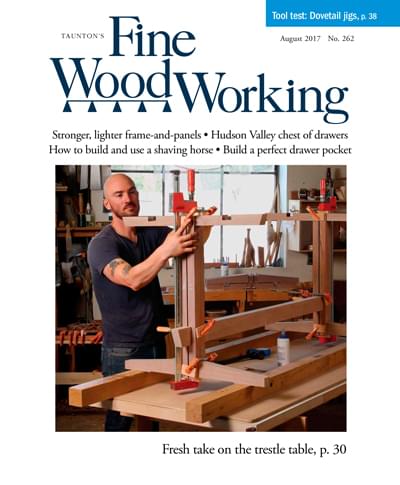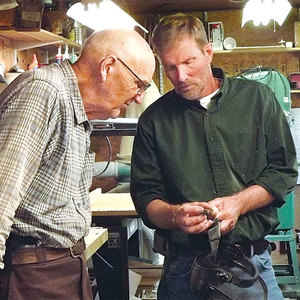From The Bench: Lessons from Shop Class
Most of the lessons learned in shop class years ago are still shaping Walter Sivigny's work habits today.

In my basement wood shop is a Colonial-style candle box made of pine. Mounted on the wall, it holds an assortment of folding rules, straightedges, and other measuring tools. It was the first woodworking project I ever created—more than 50 years ago—and it reminds me every day of where my love of woodworking was born and who I have to thank for it.
Many woodworkers of my generation first experienced the joy of shaping wood as teenagers, in a school wood shop course. For me it was seventh-grade shop class, taught by Mr. C, in Hamden, Conn. Probably in his mid-50s, Mr. C was a friendly guy who was always there to help out the 15 or so boys in our class. At the same time, he was strict about safety and did not tolerate fooling around in class.
The lessons I learned in wood shop continue to shape the way I approach woodworking projects to this day.
Lesson 1: Work slowly and deliberately
In today’s fast-paced world, it seems odd that students would spend an entire school year in a woodworking course to complete only one or two small items. However, there was a deliberate pace of instruction on all aspects of each project: learning to read measured drawings, checking dimensions, selecting and cutting the wood, hours of hand planing to smooth and square up the stock, hand sanding, and finally applying the finish. Each step was slow and careful so that we could learn and avoid mistakes.
Even today, my woodworking pace is slow. I still take the time to recheck measurements, make test cuts, and do the handwork necessary to make sure that joints fit just right. This deliberate pace has enhanced the quality of my woodworking and has made my time in the workshop relaxing and enjoyable.
Lesson 2: Take care of your tools
One of my clearest memories from shop class is how the hand tools were stored. On the walls were large wooden cabinets that held ripsaws, coping saws, mallets, handplanes, clamps, and racks of chisels. Inside the cabinets, our teacher had painted black silhouettes of every tool, so that students could easily return each one to its proper place.
This simple arrangement taught me to take care of my tools. My hand tools hang on pegboard over my workbench. My small power tools reside in drawers and cabinets. There are no tool silhouettes painted on the walls, but I never have to search for a missing chisel or waste time looking for my backsaw.
Lesson 3: Respect power tools
While I’m sure that the junior high school wood shop had many stationary power tools, the only one I remember is the wood lathe. It scared me. It was large, noisy, and very powerful. It could spin heavy blocks of maple at dizzying speeds, and if you were not careful, it could wrench a gouge out of your hand and hurl it across the shop. We were taught the safe way to use the lathe, and over time I learned to use it more confidently and eventually produced a little maple bowl.
The fear that I felt as a boy evolved into a man’s respect for power tools. I never use them without protecting my eyes and ears. I pay attention to the setup for a cut, think about where my hands are, and assess kickback potential. I concentrate on what I am doing and never work when I am tired. I test out an operation and only proceed when I am comfortable with it. If something doesn’t feel right and I sense that old tinge of fear that reminds me of the wood lathe, I stop. This important lesson has served me well and kept me safe over the years.
Lesson 4: Take pride in your work
I’ll never forget the feeling of satisfaction I got after bringing my finished projects home from school. These feelings have grown over the years as the quality of my work has improved. When I rub my hand across the smooth maple top of my Shaker chest of drawers, I get the same sense of fulfillment as I got when I first felt the smoothness of that little turned bowl so many years ago.
Each time I turn on the light in my workshop, my mind takes a brief trip back to junior high wood shop. I remember the lessons learned. I reflect on a lifetime of woodworking. And I am thankful.
Walter Sivigny is a woodworker in Meriden, Conn. To share your woodworking stories, email us at [email protected]
From Fine Woodworking #280
 |
|
 |
|
 |
























Log in or create an account to post a comment.
Sign up Log in